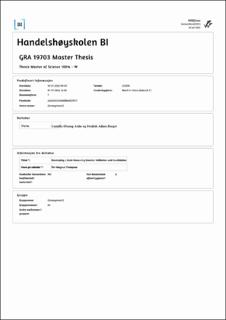| dc.contributor.author | Aulie, Camilla Øisang | |
| dc.contributor.author | Berget, Fredrik Adam | |
| dc.date.accessioned | 2022-12-05T09:33:56Z | |
| dc.date.available | 2022-12-05T09:33:56Z | |
| dc.date.issued | 2022 | |
| dc.identifier.uri | https://hdl.handle.net/11250/3035798 | |
| dc.description | Masteroppgave(MSc) in Master of Science in Leadership and Organizational Psychology - Handelshøyskolen BI, 2022 | en_US |
| dc.description.abstract | How leaders attempt to manage employees’ emotions serves as a prominent
topic within the fields of leadership and emotions. Emotion validation and
invalidation refer to various ways leaders respond to employees’ emotions. Based
on a lack of research and literature on how leaders manage employees’ emotions,
researchers and scholars often refer to these concepts as promising topics of
investigation. To contribute to the literature and research regarding how leaders
manage employees’ emotions, we attempt to develop a valid scale measuring
emotion validation and invalidation. Three studies were included in the scale
development process. The first study involved a qualitative investigation of 30
MBA students’ experiences with emotion validation and invalidation. This study
resulted in categories and a pool of items, which were further reviewed by experts
in our second study. The expert review resulted in 44 items, which were included
in a quantitative study. By performing principal component analyses and
conducting post-analyses assessing for validity and unidimensionality, the pool of
items was reduced to 10 items. The scale of 10 items contributes to theory and
research about emotion validation and invalidation, which thus reflect different
ways leaders attempt to manage employees’ emotions. | en_US |
| dc.language.iso | eng | en_US |
| dc.publisher | Handelshøyskolen BI | en_US |
| dc.subject | ledelse organisasjonspsykologi leadership organizational psychology | en_US |
| dc.title | Developing a Scale Measuring Emotion Validation and Invalidation | en_US |
| dc.type | Master thesis | en_US |
